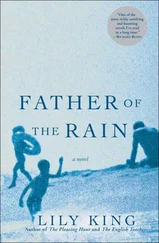APRIL WASN’T SURE WHAT AT FIRST CAUGHT HER EYE. USUALLY SHE WAITED for the customers to see her, need her attention, and she liked to toy with them, dragging her eyes slowly up off her magazine to their eager faces. But these two she was watching even before they came through her door. The driver got out first, scanned the street, then opened the back. He leaned in all the way and April expected him to bring out some sort of jacket or bag, but instead it was an old woman, stooped and shoeless. They stopped outside the door, admiring the ribbons. April was in charge of tying fresh bows, twenty-five of them, every morning and replacing the ripped, faded, or stained ones. She hoped Billy Hughes, who’d never eaten here as far as she could remember, had seen a picture of her work. Could they get mail over there? Probably not.
The old lady raised her hand and ran it down every ribbon like a child. April almost called out to her to stop but then wondered if the woman was retarded and let her finish. They finally pushed through, the young fellow struggling a bit to keep the woman upright and the door open. She’d been all wrong about their ages. The driver was a mere boy, and April didn’t know a state in the union that let fourteen-year-olds drive. And then the old lady: she wasn’t much over forty, a good deal younger than April. She could tell by the hair. Nothing stiff or brittle about it. It was young hair, even if the face was a bit trashed.
“Y’all two?”
The boy seemed confused by the question. April held up two menus and pointed to a booth. He nodded, and followed on behind her.
She heard him whisper at her back, “Is it all right that she has no shoes?”
There was something special about this boy. The way he tipped his head up to her when he ordered, the way he maintained eye contact even though it seemed to pain him.
“I’m losing my marbles,” April muttered as she threaded the order up into the rod on the other side of the window.
“You just figuring that out now?” Dave said, snapping up the ticket, then groaning about the onion rings.
April went back to her perch at the register. She could see the boy’s profile from there. He was talking but the woman wasn’t talking back. She was bent over her cup of coffee, her hair everywhere, the barrette in back useless. She was a sight. When he gave up, his eyes drifted around the restaurant, though his mind seemed caught somewhere else entirely.
Dave grunted, and she spiked their ticket and brought them their food.
“Thank you so much,” he said for both of them.
She looked at the photo of Sgt. Billy Hughes on the wall. He’d always seemed so innocent. All these weeks she’d been staring at his face and she’d never noticed the hint of arrogance in his eyes, the mischief in his mouth. April bent her head and prayed for God to forgive her those last thoughts and deliver all the hostages home where they belonged. She raised her head and there was the boy standing on the other side of the counter, wanting to know about the restrooms. She pointed and he signaled to the woman and they went down the hallway together. April cleared their dishes. His plate was clean, but she’d barely taken a bite. As she moved to the kitchen, she heard a commotion down where they’d gone. She peeked into the dark hallway. The woman was clutching the boy with both hands. “Please don’t make me,” she whispered. “I’ll be right out here,” he said, calm and steady. “Let’s not go through this again.” “I can’t. I can’t.” She had slipped to the ground. The boy finally gave in and the two disappeared into the ladies’ room.
“Where y’all headed?” she said when he reappeared at her counter with the bill and a twenty, trying to maintain the incurious tone she usually had with out-of-towners.
“Uh.” The boy looked at her desperately. He was the kind of kid who seemed incapable of a lie.
“You’re just heading out,” she said dramatically, sweeping her arm westward. She shrugged up her shoulders, turned down her lips, and said, “Maybe all the way to California.”
The boy laughed. “Maybe,” he said, and then with the first animation she’d heard in his voice, “Maybe!”
He took the change with another smile, shoved two dollars into the tip jar, and called out, “C’mon, Ma.”
It was rude to not even call out good-bye, but she felt like she’d been punched in the chest, hearing Ma, knowing now this was that sweet boy’s mother. Why hadn’t she guessed they were related? Because there are just some women who you know have never raised a child. It’s in their eyes. April herself was one of them. That woman, she’d have sworn, was another.
Just before they stepped off the curb, the boy tried to take his mother’s arm. But she jerked away fast, as if his touch would burn. She lay down in the back, disappearing from April’s view. With the engine running, his hands on the wheel, the boy sat stockstill, his face set and his mouth so pale it seemed to disappear.
April wiped her tears quick away. Dave would make such fun if he saw.
CALIFORNIA, THE LADY HAD SAID. SHE MADE IT SOUND SO CLOSE.
He’d been driving for three days. For a few hours each night he’d gotten off the highway and found an empty parking lot. In one of the far corners, he’d park, lock the doors, and sleep. Then he’d find some doughnuts and coffee and be off again.
He loved coffee. He loved driving. There were long stretches each morning when the road was empty, the music was good, and he didn’t even care about his mother behind him. That time of day, the coffee zinging inside him, he could think of anything without defeat. He relived his night with Kristina, the shape of her sleeping lips, the weight of her against him. And his kiss with Fran, the sound of which he often replicated with his mouth on the back of his hand. And when those memories made him too horny (if he were alone in this car he’d be masturbating round the clock), he just let his mind drift to other pleasant times. The consequences came later, in the afternoon, when the caffeine had gone and he was light-headed with hunger. He rarely stopped for lunch. Lunch places were always crawling with cops. They had early dinners at remote diners. He wished he could leave his mother in the car — she never ate more than a french fry, and without shoes or a brush or an interest in speaking, she called so much unnecessary attention to the two of them. But she couldn’t be anywhere by herself. And she was always terrified they were driving through Texas. After hours of silence, she’d suddenly rise up from the back and demand to know where they were. After he reassured her, she slept. She dreamed. She yelled out things he couldn’t understand. She kicked at the back of his seat and he had to scold her. He turned the radio up louder and louder. He’d almost left her in Nelson, Missouri, and Silverthorne, Colorado.
California 174 mi. He thought the sign was a joke. But then, an hour later, California 110 mi. He had thought it took weeks to cross the country. California. Gena. He’d never written her a letter but he knew her address by heart. 363 Pajaro Way, Santa Lucia. He began to follow signs for San Francisco. Her town, Gena had told him at the wedding, was just south of there.
There were long stretches of time in which she believed she was in the Oldsmobile, her father behind the wheel, her mother foraging through her purse. She could hear them bickering, not the regular bickering about when to eat or which road to take but the helpless flailing sound of their disillusionment with each other. They would be moving again. “On to the next wacko scheme,” her mother would say, slowly poisoning her father’s optimism with her presentiments of doom. Vida often thought that if her mother were the man and her father the woman they would be happy together. If her mother didn’t have to conceal from the world her intelligence and ambition, if her father wasn’t expected to squeeze money out of his dreams, there might be peace. But pressed up so close to their pain, Vida learned that true life was in books, life that was, no matter the foulness and misery, beautiful and symmetrical and comforting. The Portrait of a Lady from Virginia to Albuquerque, Madame Bovary from Albuquerque to San Antonio.
Читать дальше












